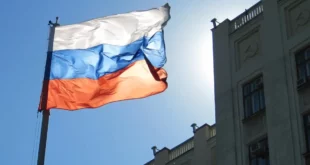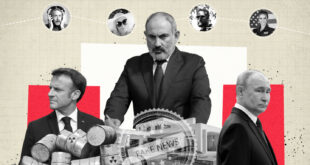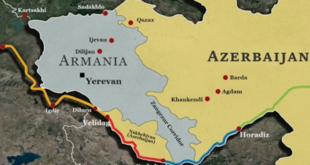 Even as a new president taking over the Kremlin reigns, long-standing tensions between Russia and Georgia over breakaway Abkhazia and South Ossetia regions in Georgia have flared dangerously recent days with each country accusing the other of provocative actions that risk war.Russia has moved troops and armor into Abkhazia last week to respond to a Georgian military buildup along the unofficial border with the breakaway region of the Caucasus republic. But Georgia has warned of military action, if Russian forces interfere. The Kremlin said the deployment was allowed under a 1994 cease-fire that stationed Russian troops in the region to prevent the kind of fighting that broke out between Georgia and “separatists” after the fall of the Soviet Union. Russian Foreign Minister Sergei Lavrov said any Georgian military action would lead to “retaliatory actions,” but stressed at a meeting with European Union ministers that Russia “isn’t planning to go to war.”Â
Even as a new president taking over the Kremlin reigns, long-standing tensions between Russia and Georgia over breakaway Abkhazia and South Ossetia regions in Georgia have flared dangerously recent days with each country accusing the other of provocative actions that risk war.Russia has moved troops and armor into Abkhazia last week to respond to a Georgian military buildup along the unofficial border with the breakaway region of the Caucasus republic. But Georgia has warned of military action, if Russian forces interfere. The Kremlin said the deployment was allowed under a 1994 cease-fire that stationed Russian troops in the region to prevent the kind of fighting that broke out between Georgia and “separatists” after the fall of the Soviet Union. Russian Foreign Minister Sergei Lavrov said any Georgian military action would lead to “retaliatory actions,” but stressed at a meeting with European Union ministers that Russia “isn’t planning to go to war.”Â
Both North Atlantic Treaty Organization (NATO) and the European Union (EU) have severely criticized Russia’s decision to upgrade its ties with the two provinces. Nato Secretary General Jaap de Hoop Scheffer said last week it had undermined Georgian sovereignty and he called on Moscow to reverse the measures. “In the political reality, this is not easing tensions, it is raising tensions,” NATO spokesman said of the Russian move. There was “a clear and sometimes sharp exchange of views, but absolutely no meeting of the minds” at the session. NATO Secretary General Jaap de Hoop Scheffer remarked that “he’d eat his tie if it turned out that a NATO MiG-29 had magically appeared in Abkhazia and shot down a Georgian drone.” Georgia, which denied bolstering its military forces on the border with Abkhazia, accused Russia of deliberately escalating tensions. And it said any change in Russian troop levels must be approved by Georgia, a position endorsed by NATO officials on April 30. Georgian President Mikheil Saakashvili said the NATO leader’s comments had been “very important” and he called for a special session of the UN Security Council to discuss the situation.
Â
Recognition for Independence
Â
Both Abkhazia and South Ossetia have been de facto independent since breaking from Georgian control in the early 1990s. Abkhazia and North Ossetia has a lot of Russians. Russia and Georgia are seen intensifying their fight over the issue of independence of the breakaway regions North Ossetia and Abkhazia from Georgia. Russia supports the independence of these regions from Georgia while Georgia opposes the move and tries to control the regions by force.
Â
Abkhazia and South Ossetia region have called on the UN and other international bodies to recognize them as independent. In its appeal, Abkhazia said it had “established itself as an independent, democratic, law-governed state”. In addition to the UN, the appeal went to the European Union, the Organization for Security and Co-operation in Europe (OSCE) and the Russian parliament. The appeal was made by the Abkhaz parliament recently, a day after Russia said it was lifting trade restrictions on the territory. Georgia condemned Russia’s move, warning that it encouraged “separatism”. Tens of thousands of ethnic Georgians were driven from their homes in Abkhazia during a war in the 1990s.
Â
Georgian residents of Abkhazia largely fled or were driven from their homes by ethnic Abkhaz in the 1990s. But Georgian President Mikheil Saakashvili said that he is determined to peacefully reassert the country’s sovereignty and reintegrate the two separatist areas. Last week, tension intensified further when an unmanned Georgian reconnaissance plane was shot down over Abkhazia by what Georgian officials said was a Russian MiG-29 fighter.
Â
The tiny former Soviet region of South Ossetia began its attempts to gain independence at the fall of the Soviet Union in the early 1990s, when hundreds died in fighting between Georgian and Ossetian forces. Many in South Ossetia see Georgia’s actions then as brutal and unforgivable. Since then the region has effectively run its own affairs with economic and political support from Russia. Meanwhile, more than 90% of voters in South Ossetia have declared they want independence from Georgia. The authorities see the referendum as a first step towards eventual union with Russia, but the result is unlikely to be recognized by any government. South Ossetia has sought secession since the early 1990s but has failed to win international recognition. The vote has further strained relations between Georgia and Russia.
Â
South Ossetian President Eduard Kokoity, who wants union with Russia, was re-elected with an overwhelming majority. Earlier he appealed to the international community to accept the will of his people, insisting the referendum was not a futile gesture. “It’s not a symbolic referendum, it’s an answer to those who won’t recognize the will of the people of South Ossetia,” he said. But people in some of the ethnic Georgian enclaves, which lie within South Ossetia, voted in what they described as alternative elections, which seemed designed to undermine the credibility of the referendum on independence.
Georgia terms the vote illegitimate and has vowed to win South Ossetia back. Georgian Prime Minister Zurab Nogaideli said that the vote “can only increase the tensions in the region”. Georgia has accused Russia of backing South Ossetia’s ambitions to undermine its pro-Western government. Georgia wants the Russian peacekeeping troops in South Ossetia to be replaced by an international force. But the South Ossetians see them as protection against what they believe are Georgian plans to invade. In a statement the EU said it did not recognize the referendum, which “contradicts Georgia’s sovereignty and territorial integrity within its internationally recognized borders”. The European human rights watchdog, the Council of Europe, denounced the referendum as “unnecessary, unhelpful and unfair”.
Â
Georgian President Mikhail Saakashvili has called on Russia to revoke its decision to strengthen links with his country’s two breakaway regions. Russia said it would intensify co-operation with Abkhazia and South Ossetia. “We demand Russia revise all decisions which violate Georgia’s sovereignty,” Saakashvili told a cabinet meeting. He also called for serious diplomatic actions from his country’s partners.
Â
Russia said the situation regarding Abkhazia had completely changed and denied the move had anything to do with recognition by some states of Kosovo’s independence. Russia says Kosovo remains part of Serbia. The Russian sanctions were to try to limit Abkhazia’s “separatist” aspirations, but they have had little “effect”. Georgia’s foreign ministry said: “This step can only be considered as an undisguised attempt to infringe the sovereignty and territorial integrity of Georgia, to encourage separatism”.
Â
Russian ambitions?
Â
Georgia’s foreign ministry accused Russia of an attempt to infringe Georgia’s sovereignty and territorial integrity, after Russia said it was lifting the sanctions it imposed in 1996. Georgia states that Russia is keen to incorporate Abkhazia into Russian Federation. Recently Russia again warned it will retaliate if Georgia uses force against its breakaway regions. Moscow has accused Georgia of preparing to invade Abkhazia, and says it is boosting Russian forces there and in the South Ossetia region. Georgia has reacted angrily to the Russian move, which its prime minister called “irresponsible”. The government of Georgia strongly condemns the act of aggression disguised as a peacekeeping operation. Russia has kept a peacekeeping force in Abkhazia and South Ossetia under an agreement made following the wars of the 1990s, when the regions broke away from Tbilisi with Russian support and formed links with Moscow. There are around 2,000 Russians posted in Abkhazia, and about 1,000 in South Ossetia. Tensions between Russia and Georgia have flared up recently, despite Russia lifting economic sanctions against Georgia earlier last month.
Â
Georgia, a member of the 151-nation WTO group, said it had cut off talks with Russia over membership. Aspiring members can be vetoed by any existing member. Georgia is also smarting from a Russian ban on the import of Georgian wines, mineral water and vegetables. Russia wants to enter the World Trade Organization (WTO) but opposed by Georgia, while Georgia wants to be NATO member but opposed by Russia and resultant tensions have got reflected on their relations for quite some time. Georgia’s entry into NATO, gong by the NATO sources, is only a question of time, where as Moscow drive to enter WTO might not be easier as things stand now.
Â
These issues have made impact on the issue of independence. Last week Georgia accused a Russian plane of shooting down an unmanned Georgian spy plane – which Russian authorities insisted was shot down by Abkhaz rebels. Georgia said it was blocking Russia’s entry to the World Trade Organization. With the latest statement the Russian government has pushed the already bellicose rhetoric between the two countries to a new level. NATO countries such as Poland, Hungary and Bulgaria still operate MiG fighters.
Â
The Bush administration sharply criticized Russia for what it called a series of “provocative actions” Moscow unilaterally withdrew from trade and military sanctions on Abkhazia imposed by a grouping of former Soviet republics that includes both Russia and Georgia. Georgia has announced it was withdrawing from a 1995 agreement that coordinated air defenses among defense ministries in the Commonwealth of Independent States. These steps have significantly and unnecessarily heightened tensions in the region. USA has asked Moscow to “de-escalate and reverse its measures, Moscow must begin playing a true mediator role in the dispute and reiterate its commitment to Georgia’s “territorial integrity and sovereignty. However Moscow retrieved the economic contacts with Georgia.
Â
Crossing Swords
Â
The Kremlin is angry over Georgia’s attempts to enter NATO; Moscow considers that would add to Russia’s security threat perceptions. The government in Tbilisi, the Georgian capital, has been at odds with Moscow over Georgia’s desire to join NATO. Last month under pressure from president Putin, NATO decided not to grant Georgia’s request to join its Membership Action Plan but promised it would eventually become a member of the alliance. Russia emphasized that it was not seeking to inflame the situation. Rather, it said, it was trying to protect the rights and legal interests of Russian citizens who make up the majority of the population in Abkhazia and South Ossetia.
Â
Relations between Russia and Georgia, always fraught, plummeted early this month after President Vladimir Putin said he intended “to further broaden and deepen multifaceted practical cooperation with Abkhazia and South Ossetia for the good of their people.” The declaration infuriated Georgia, which saw it as another step by Moscow to bolster a drive by “separatists” for independence or to absorb the two generally pro-Russia regions. Russians are now investing heavily in Abkhazia and most of the people there have obtained Russian passports.
Â
A statement from the Russian foreign ministry said that a bridgehead is being prepared for the start of military operations against Abkhazia; Russia says Georgia is massing 1,500 soldiers and police in the upper Kodori Gorge, the only part of Abkhazia which remains under government control. Moscow is increasing Russian “peacekeepers” in both Abkhazia and Georgia’s other breakaway region of South Ossetia. Georgia denies any build-up of its own forces in the area, and says that Russia is taking provocative action to cause extreme destabilization in the region. “From now on, we consider every [Russian] soldier or any unit of military equipment coming in [to Abkhazia and South Ossetia] as illegal, potential aggressors and potential generators of destabilization.”
Â
After meeting with Russian Foreign Minister Lavrov, EU foreign policy chief Javier Solana called on Russia to show restraint, saying increase troop numbers would be unwise given current tensions. Russia’s foreign minister said his country was not preparing for war but would “retaliate” against any attack. Lavrov said that Russia had to protect Russian-passport holders in the regions and that if Georgia took military action, Russia would have to take “retaliatory measures”. Solana’s comments reflect a growing concern that NATO’s promise to admit Georgia as a member one day, despite strong Russian opposition, could have unpredictable consequences. In Washington, National Security Council spokesman Gordon Johndroe said the USA was “concerned about reports from the region.”
Â
An Observation: Double Standards?
Â
Russia’s deadly oppostion to Chechnya’s independence bid is well known as Moscow has killed thousdands of Chechens to put down the independece movement being launched by the Cehechens who lost soverignty way back to the Russians. But Moscow does encourage freedom moves in Georgia and is cool about the same bid in Azerbaijan. In all initiatives of Moscow the underlying point is to pursue its so-called national economic intersts and counterpose the US initiateves if they don’t promote Russian interests as well. Russian support for USA in Afghanistan terror war has been undertaken keeping in view this principle.
Â
Russia opposes Georgia’s efforts to draw closer to the United States and NATO, saying membership in the alliance would pose a direct threat to Russia. Many in Abkhazia believe that Kosovo’s announcement of independence from Serbia in February provides a precedent for it to be recognized as an individual state. Whereas in Nogorno-Khabhak case, where this breakaway region has declared independence form predominantly Muslim Azerbaijan, Russia cooperates with USA to find a solution in favor of the newly independent region, in the case of Abkhazia it clearly opposes Georgia. All the recent developments have fueled international fears that full-scale fighting could break out involving Georgia, Abkhazia and the strengthened Russian peacekeeping force.
Â
Georgia has just recently also threatened to block Russian membership in the WTO in retaliation for Moscow’s recent actions, particularly Putin’s decision to step up ties with Abkhazia and South Ossetia and in reply to Moscow’s pressure on NATO to postpone Georgian membership last month. Talks will resume when Moscow reverses its move toward new ties with Abkhazia and South Ossetia, according to officials in Tbilisi. “There will be no step forward on Russia’s entry to the WTO until Russia reconsiders its decision,” said Georgia’s acting foreign minister, Grigol Vashadze. USA has strongly contemned Russian maneuvers in Georgian regions.
Â
Russia a veto wielding UNSC member with considerable influences world over, would take any opposition, let alone threat, to Russian posture in world affairs. Kremlin expects Tbilisi to be considerate with its former Russian friend. Most of the former Soviet republics (FSR) that have become independent nations now have joined the Western hemisphere of monopoly politics and they resent the Kremlin influences and resist any move by Russia to control them by any means. Georgia says that Russia still considers like Georgia, like the entire former Soviet space, as its own backyard, legitimate zone of national interests and it seeks obedience and cooperation from every single FS state, while any deviation or protest is construed by Moscow as a serious threat to its very security. When every possible diplomatic effort, including energy diplomacy, fails, Russia would resort to the war threat. The Moscow-Tbilisi standoff might lead to a sort of war between them, endangering peace and security of the region, unless the UN intervenes without losing time any more.
Abdul Ruff
Source: Global Politician
Kavkaz Center
 Eurasia Press & News
Eurasia Press & News



